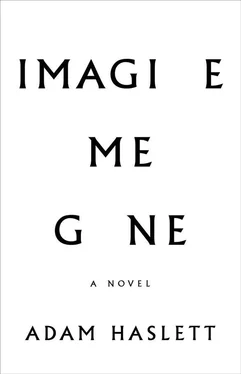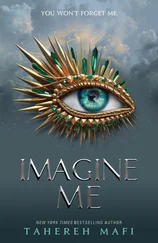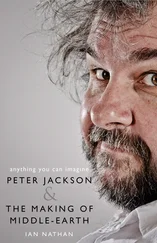Though it was expensive, I had made a reservation for tea at Browns. But I could see now that this was completely wrong and stuffy, and that what we needed was alcohol. The pub we ended up in turned out to be full of university students, shouting at each other over the blare of Depeche Mode’s “Shake the Disease.” I got us drinks. After half a pint she seemed calmer. Which is when she said it was time she cleared something up. She thanked me for being kind to her over the last few weeks, but said that I had gotten the wrong idea. She shouldn’t have kissed me, she said. It had been a mistake. It wasn’t my fault, she added, she had let it happen. At which point, she reached into her bag and handed me back all my cassettes.
In retrospect, I suppose the cruelty of the gesture may have been her attempt to cauterize the wound as she inflicted it. I only knew that she was delivering me into purgatory, between the irrevocable hope of being with her and the death of life without her.
It was the next morning that Simon’s mother woke me early to say I had a phone call. I went down to the kitchen in my pajamas and stretched the phone cord over to the Aga to warm myself. It was Peter Lorian, my father’s oldest friend, calling to say my father was dead. I asked where they had found him. He said in the woods. I was to meet him at Heathrow the next morning. He’d made reservations for the two of us to fly to Boston. He said he was terribly sorry, and that I would need to take care of my mother now. We hung up, and I went back upstairs to sleep another forty-five minutes before it was time to come down for breakfast. When I told Simon and his family the news, they looked appalled.
I was at the doorstep of the salon no later than nine thirty. It was an hour before one of Angie’s colleagues eventually appeared to open the shop and told me I had better buzz off.
Have you ever had an EKG?
Alas, no.
How many caffeinated beverages do you drink a day?
What I have always found most comforting about these forms is the trace of hope I get as I’m filling them out. How they break your life down into such tidy realms, making each seem tractable, because discrete, in a way they never are beyond the white noise of the waiting room. You get that fleeting sense that you’re on the verge of being understood, truly and fully, and for the first time, if you could just get it all down in black and white before the receptionist calls your name.
Please briefly describe your work history:
My first legit employment began in the fall of 1985, after Dad, when I moved to London with Simon, as we’d planned. Z80 machine code was much in demand at the time, and I happened to have picked it up as a youth. I got a programming job at a small firm stocked with early video-game fiends who spent their off-hours disassembling Ataris. Later, during my various periods of under- or unemployment, my mother would say, Why not go back to computers? You were so good at them. But she hadn’t experienced the conditions I was working under, conditions I knew would be the same wherever I went: the stupefying lack of humor, the wretched taste in music, and all that unforgivable clothing.
Of this last item, I should say, it wasn’t just my colleagues’ ignorance of peg-legged jeans or the use of eye shadow in club dress. Trends come and go. These boyos were ignorant of the entire canon of twentieth-century menswear, of the precepts laid down by masters like Montgomery Clift and the emperor of Japan. Rules as precise as the laws of British prose. You could violate them for effect, but only if you understood them. Which meant seeing how the lines of architectural modernism had been recapitulated in wool and linen, softened only by the heraldic color and pattern of accessories. The members of Joy Division likely weren’t meditating on Frank Lloyd Wright when they took the stage in Manchester but those flat-fronted black cotton trousers and narrow-cut shirts didn’t come from nowhere. Peter Saville, who designed Factory’s records, understood it perfectly well: the iconic weight of black and white balanced against the release of splendor, in this case the dark magnificence of the music itself. Which might describe the tension of Protestant affect more generally: all guardedness and restraint until the eruption of an unextirpated beauty wakes us for a moment from the dream of efficiency.
The point being, my cubicle mates at NextFile couldn’t make it through a London club door to save their lives. I had to make it through those doors because of what was being played on the other side: early Chicago house, or some of the most sublime dance music ever recorded. Frankie Knuckles, Marshall Jefferson, Jesse Saunders — Roland drum-machine royalty. White-rock homophobia may have killed disco on American radio play but the arc of history bends toward justice. They could burn Diana Ross records at a White Sox game, but on the south side of Chicago four-to-the-floor beats rose from the ashes and got stretched onto ten-minute loops by DJs sampling the heaven out of classic disco. The ubiquity of its traces may render it invisible today, but early house had the power of all original art, to reveal the structure of the present: the body on the rack of the electronic, the mind on the rack of the virtual. And it didn’t just lay the structure bare, it gave a body a means to metabolize it, making the new relentlessness as human as dance.
Repurposing historical forces of that size required the power of volume, i.e., a sound system that shook your rib cage, whose subwoofers slapped air to your brow with every beat of the kick drum. Music thick as a hurricane. When the world wants to kill you, sometimes inoculation requires killing little bits of yourself. In this case, your eardrums.
But in London at the time, if you weren’t wearing at least a thread or two by Vivienne Westwood, you couldn’t get past the velvet rope. As Boy George later recalled, a dandy working the door at Taboo off Leicester Square once held a mirror up to a lager lout and said, Would you let yourself in? So I did what was required. I quit NextFile and got a job as a shop assistant at Browns (London clothier, not Oxford restaurant), hawking everything from Katharine Hamnett to Yohji Yamamoto. Chambray shirts to die for. Linen pants cut to break your heart. My sartorial standards may have peaked at nineteen but they peaked high. With the store discount and a kebab diet, I could afford to attire myself well enough to pass through those yearning crowds like Marcel into the salon of the Duchesse de Guermantes. Doormen would pick me from the back of the crowd on my shirts alone. Inside Taboo or Pyramid Night at Heaven, or the less discriminating Delirium, I’d order a beer to have something to hold on to as I stood at the edge of the dance floor. I didn’t know anyone at the center of the scene, where the drugs circulated and the outrageous posed, and I didn’t particularly want to. I just needed to be in the hurricane, in that storm blowing in from paradise, pushing skyward the wreckage of James Brown and George Clinton and the Jamaican dub masters and, yes, Giorgio Moroder and the German industrialists, and all the forgotten producers and DJs who kept the ideas and the vinyl coming, vanishing mediators of a culture considered too throwaway to chronicle. Or perhaps it’s simplest just to say, in the words of Mr. Fingers, intoned in the cadence of King:
In the beginning, there was Jack, and Jack had a groove.
And from this groove came the groove of all grooves.
And while one day viciously throwing down on his box, Jack boldly declared,
“Let there be house!”
and house music was born…
And in every house, you understand, there is a keeper.
Читать дальше












